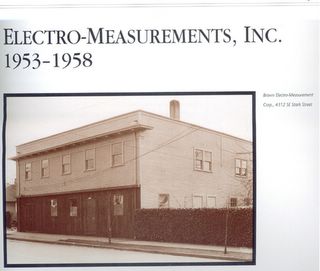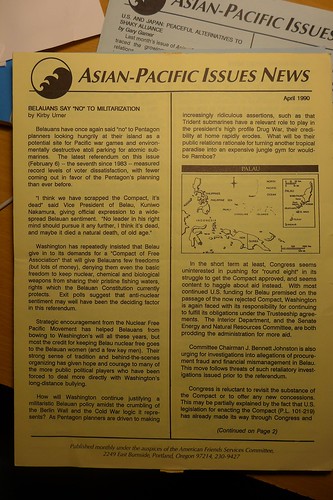My history with AFSC (American Friends Service Committee) starts at the Multnomah Meeting meetinghouse in the early 1960s, in a building formerly owned by an electronics firm run by pacifists.
Doug Strain, though not a Quaker, had been a conscientious objector during WW2. One of his principal clients, at least in the early days, was Hewlett-Packard.
When Doug's company outgrew its Stark Street digs, it was given over to Friends, with the understanding that AFSC, always supportive of conscientious objectors, would keep its offices there as long as needed.
Doug Strain, though not a Quaker, had been a conscientious objector during WW2. One of his principal clients, at least in the early days, was Hewlett-Packard.
When Doug's company outgrew its Stark Street digs, it was given over to Friends, with the understanding that AFSC, always supportive of conscientious objectors, would keep its offices there as long as needed.
"Friends Meeting House"
from company archives
courtesy of Wanderer Doug Strain
from company archives
courtesy of Wanderer Doug Strain
This was around the time I was born (1958) and our family moved to Portland, transferring membership from 57th Street Meeting in Chicago to this newly forming Stark Street meeting.
I've always associated AFSC's work with lots of paper, lots of typing and publishing. Activism is a cerebral thing I discovered, more about thinking and communicating than marching in the streets. We did a lot of that too though, but with different organizations.
Women's Strike for Peace and Women's International League for Peace and Freedom (WILPF) took up a lot of mom's efforts. She wanted a better and safer world for her family. Trace amounts of radioactive materials were showing up in the food supply. Linus Pauling was warning people of the dangers of a nuclear weapons economy. His wife, Ava Helen, was likewise in WILPF, though she and mom didn't know each other.
In the summer of 1972, after some years in Rome, Italy, my parents agreed to help run an AFSC camp in Ramallah, at that time a much smaller town than today, on the outskirts of Jerusalem.
The plan was to help build a swimming pool with local Palestinians, in cahoots with students from the American University in Beirut, followed by some time on a kibbutz where we would learn from Israeli experts.
The project came off pretty much as planned though we were far from finishing that swimming pool, which had to be blasted from solid rock.
Fast forward to the mid 1980s and I'm back in Portland after finishing high school in the Philippines (I started at Southeast High in Bradenton, Florida), attending Princeton (Class of 1980) and serving as a high school teacher in Jersey City for two years, among other jobs.
As a young adult, I worked with Paulette Wittwer on the plight of Palau, and Pacific Islanders more generally. The nuclear weapons economy was hurting them too. Palauans had tried to declare themselves a nuclear free zone, but Washington, DC was in no mood to accept defiance from a protectorate and insisted they keep voting until they get it right and allow nukes, at least in principle.
Palau has since achieved independence and membership in the UN.
Our AFSC office, now on East Burnside, published Asia-Pacific Issues News. We looked at issues around refugee resettlement, the dangers of nuclear energy (in Japan especially), and the negative effects of a nuke weapons economy. I eventually became the editor of this newsletter, which no longer publishes and is hard to find in any archives.
:: APIN: archive copies ::
After that, I served AFSC as a volunteer program clerk for several years. We had a youth leadership program aimed at improving communications between Asian and Hispanic (Latin American) high schoolers, and providing opportunities to travel, organize conferences, and produce media.
I participated in staff searches and some of the program activities. I'd become an advocate for youth-focused programming centered around helping high schoolers develop media skills. Voz Juvenile was on local community television. United Voices was our literary magazine.
In a next chapter, I served as a member of the AFSC corporation on behalf of North Pacific Yearly Meeting (NPYM) which paid for my trips to Philadelphia for annual meetings. In order to ground itself as a Quaker organization, AFSC has an elaborate way of interfacing with various Yearly Meetings. My accounts of these Philadelphia meetups appear in these online journals (blogs).
Finally, I served on an Area Program Committee in support of staff and program. However, AFSC was feeling financial pressures and decided to downsize in Portland, moving from East Burnside and ending its work with youth. As of 2018, I'm not doing anything with AFSC directly.


